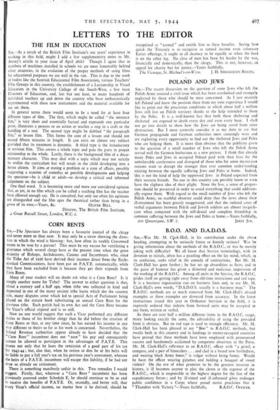THE FILM IN EDUCATION
LETTERS TO THE EDITOR
Suz,—As a result of the British Film Institute's ten years' experience in working in this field, might I add a few supplementary notes to Mr. Anstey's article in your issue of April 28th? Though I agree that in numbers of machines installed in schools we are most lamentably behind other countries, in the evolution of the proper methods of using films for educational purposes we are well in the van. This is due to the work of bodies like the Scottish Educational Film Association, various Teachers' Film Groups in this country, the establishment of a Lectureship in Visual Education in the University College of the South-West, a few keen Directors of Education, and, last but not least, to many hundreds of individual teachers up and down the country who have enthusiastically experimented with these new instruments and the material available for use on them.
In general terms there would seem to be a need for at least four different types of film. The first, which might be called "the sentence film," is very short and essentially factual and expounds one particular point, illustrates a process or an action or teaches a step in a craft or the handling of a tool. The second type might be dubbed "the paragraph film," or lesson film. This forms the core of a lesson and should not exceed fifteen minutes in length. It can exist on almost any subject provided that its treatment is dynamic. A third type is the introductory or revision film. This covers a whole topic and puts the parts in proper relationship to the whole. Lastly, there is the background film of a docu- mentary character. This may deal with a topic which may not strictly be within the curriculum but will result in the child developing into a better citizen. It aims at stating a problem or a state of affairs, possibly suggesting a number of remedies or possible developments and helping the spectator—be it chikl or adult—to develop a critical and informed judgement on the subject.
One final word. It is becoming more and more our considered opinion that, as yet, in no film which can be called a teaching film has the teacher been allowed enough say. He is consulted, but only too often his opinions are disregarded and the film apes the theatrical rather than being in a Director, The British Film Institute. 4 Great Russell Street, London, W.C. 1.






















 Previous page
Previous page